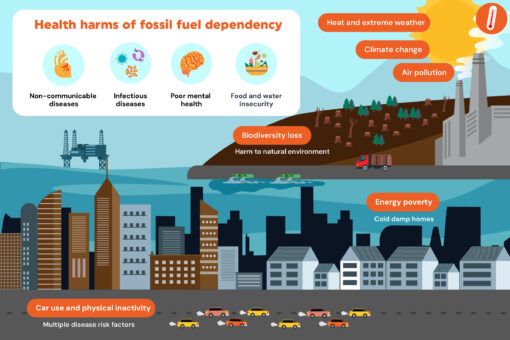
The call comes in response to a government consultation that seeks to update the current Environmental Impact Assessment (EIA) guidance to include scope 3 emissions, i.e. emissions produced when the oil and gas are used, for example as petrol or diesel in motorised vehicles or gas boilers to heat buildings.
The government is updating the guidance following a Supreme Court ruling in June 2024, which found the decision to grant planning permission for an oil development in Surrey to be unlawful because the end-use emissions from burning the extracted oil (scope 3 emissions) were not assessed as part of the EIA. Only the scope 1 and 2 emissions had been considered (i.e. those produced during the extraction process). The ruling has led the government to revise the current guidance for offshore oil and gas exploration, production, unloading and storage to include the assessment of end-use emissions.
The UK Health Alliance on Climate Change has highlighted that emissions from fossil fuels harm health and our health service in multiple ways and that the short and long term health risks posed by combustion emissions should be considered in evaluating the likely effects of scope 3 emissions.
The World Health Organization (WHO) has declared climate change to be the major threat to global health. Climate change poses multiple harms to physical and mental health from floods, wildfires, heatwaves, severe storms, spread of infectious diseases, food and water insecurity. The risks to health become more severe with each increment of a degree in global heating.
Alongside climate change impacts, pollutants produced from combustion emissions are also hazardous to human health. Short-term exposure can impact lung function and breathing, exacerbate asthma and increase hospital admissions and mortality. Long-term exposure can reduce life expectancy due to respiratory diseases, cardiovascular diseases, and lung cancer, and has been associated with dementia, diabetes, poor birth outcomes and cognitive decline.
Health systems are also at risk, both from increasing patient demand as a consequence of climate change risk factors and the threats to health infrastructure from over-heating, flooding, and other unpredictable extreme weather events.
In the response to the consultation, the UKHACC has also said that emissions produced from proposed new oil and gas projects should also be considered in relation to the UK’s obligation to account for cumulative emissions and historical contributions by cutting emissions more rapidly and to meet commitments made at COP28 to transition away from fossil fuels in energy systems in a just, orderly and equitable manner.
They also note the global influence that must be considered. If the UK opens new fields, it weakens its diplomatic standing and gives license to other governments to continue opening new fields too, further placing health at risk. In particular, poorer countries are less likely to begin a phaseout of fossil fuel extraction while countries such as the UK continue to open new fields.
Because of this wider influence, the impact of opening new fields – or deciding not to do so – is much greater than the direct emissions from the fields alone and should be considered in assessing new projects.

A Just Energy Transition for the Good of Health
Our policy report outlines in detail the health harms of fossil fuels and presents a vision for an achievable cleaner, more sustainable energy system.
